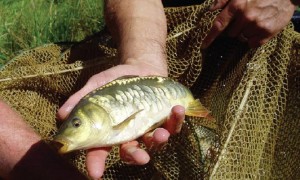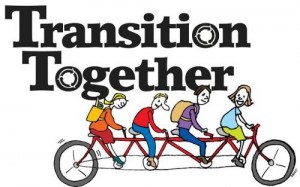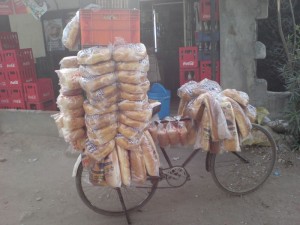Transition Culture has moved
I no longer blog on this site. You can now find me, my general blogs, and the work I am doing researching my forthcoming book on imagination, on my new blog.
Come find me at robhopkins.net
2 Oct 2009
 For today’s post, I am handing over to Jimmie Hepburn, who farms organic carp quite near to me here in Devon. During the Middle Ages, carp farming was commonplace, but once we were able to harness the power of ancient sunlight to plunder the sea, it mostly died out. Jimmie’s project, Aquavision, is beginning to make freshwater aquaculture financially viable. He wrote an excellent article on the latest edition of ‘Organic Farming’ magazine (Issue 101: for subscription details call 0117 914 2447). I thought it was rather wonderful, and asked to be able to reproduce it here. You can read the full article here.
For today’s post, I am handing over to Jimmie Hepburn, who farms organic carp quite near to me here in Devon. During the Middle Ages, carp farming was commonplace, but once we were able to harness the power of ancient sunlight to plunder the sea, it mostly died out. Jimmie’s project, Aquavision, is beginning to make freshwater aquaculture financially viable. He wrote an excellent article on the latest edition of ‘Organic Farming’ magazine (Issue 101: for subscription details call 0117 914 2447). I thought it was rather wonderful, and asked to be able to reproduce it here. You can read the full article here.
Read more»
1 Oct 2009
 Food security and the need for GIS models
Food security and the need for GIS models
As expected, the recent paper ‘Can Totnes and district feed itself?’ has started stirring things up. An intriguing response comes from Colin Tudge, a director of LandShare CIC (co-funders of the research) and leader of the Campaign for Real Farming. Colin’s thesis is that the food security issue is a simple matter of feeding the population as far as practical from local sources, recognising that some trade between specialist production areas will always be necessary. He argues that we simply need macronutrients (energy foods and protein), mainly in the shape of grains, and micronutrients – vitamins and minerals – and that by growing lots of wheat and encouraging more urban horticulture we can feed ourselves. I’m brutally over-summarising, of course, but he is keen to keep things simple.
Read more»
30 Sep 2009
 The Transition Together project forms small, social groups of friends, neighbours and colleagues and then supports them in taking a number of effective, practical, money-saving and carbon-reducing steps. A workbook helps each person to build their own Practical Action Plan that improves household energy efficiency, minimises water use, reduces waste (and consumption), explores local transport options and promotes the great value, healthy food available locally. It also helps everyone to understand what’s behind the rising energy prices and climate change, and what this means for them, their family and their local community.
The Transition Together project forms small, social groups of friends, neighbours and colleagues and then supports them in taking a number of effective, practical, money-saving and carbon-reducing steps. A workbook helps each person to build their own Practical Action Plan that improves household energy efficiency, minimises water use, reduces waste (and consumption), explores local transport options and promotes the great value, healthy food available locally. It also helps everyone to understand what’s behind the rising energy prices and climate change, and what this means for them, their family and their local community.
Read more»
29 Sep 2009
 As a response to the recent discussions about Ted Trainer’s critique of Transition, Ted recently sent me the following.
As a response to the recent discussions about Ted Trainer’s critique of Transition, Ted recently sent me the following.
“Unfortunately Rob’s reply to my article A Friendly Criticism of the Transition Towns Movement, didn’t reach me. Here is a response to his comments of 8th Sept. My discussion began by stressing the enormous importance of the Transition Towns Movement, and how inspiring it is. I’m among those who have been arguing for decades that the salvation of the planet can only come via the development of local economies. But for a long time nothing like this emerged, apart from the heroic pioneering of the eco-villagers. But suddenly the Transition Towns Movement has exploded onto the scene, obviously tapping into a widespread recognition that mainstream society is unsustainable.
Read more»
29 Sep 2009
 Marc Wegerif is an old school friend of mine from when I grew up in Bristol. After school he moved to South Africa and was very involved in activism there, and he now lives in Tanzania and works for Oxfam. He recently got back in touch and I sent him a copy of The Transition Handbook. Subsequently he sent me a long and thoughtful letter, with his reflections on the book, and on how it might relate to Africa. The whole question of what Transition might look like in a developing world context is something we have rarely explored at Transition Culture, and Marc has given me permission to reprint his letter here by way of initiating that discussion.
Marc Wegerif is an old school friend of mine from when I grew up in Bristol. After school he moved to South Africa and was very involved in activism there, and he now lives in Tanzania and works for Oxfam. He recently got back in touch and I sent him a copy of The Transition Handbook. Subsequently he sent me a long and thoughtful letter, with his reflections on the book, and on how it might relate to Africa. The whole question of what Transition might look like in a developing world context is something we have rarely explored at Transition Culture, and Marc has given me permission to reprint his letter here by way of initiating that discussion.
Read more»
 For today’s post, I am handing over to Jimmie Hepburn, who farms organic carp quite near to me here in Devon. During the Middle Ages, carp farming was commonplace, but once we were able to harness the power of ancient sunlight to plunder the sea, it mostly died out. Jimmie’s project, Aquavision, is beginning to make freshwater aquaculture financially viable. He wrote an excellent article on the latest edition of ‘Organic Farming’ magazine (Issue 101: for subscription details call 0117 914 2447). I thought it was rather wonderful, and asked to be able to reproduce it here. You can read the full article here.
For today’s post, I am handing over to Jimmie Hepburn, who farms organic carp quite near to me here in Devon. During the Middle Ages, carp farming was commonplace, but once we were able to harness the power of ancient sunlight to plunder the sea, it mostly died out. Jimmie’s project, Aquavision, is beginning to make freshwater aquaculture financially viable. He wrote an excellent article on the latest edition of ‘Organic Farming’ magazine (Issue 101: for subscription details call 0117 914 2447). I thought it was rather wonderful, and asked to be able to reproduce it here. You can read the full article here.

 As a response to the
As a response to the 

